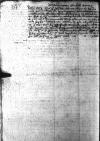List #3453
[Ioannes DANTISCUS] do Achatius TRENCKHeilsberg (Lidzbark Warmiński), 1548-10-24
Rękopiśmienne podstawy źródłowe:
Pomocnicze podstawy źródłowe:
| ||||||
Tekst + aparat krytyczny + komentarzZwykły tekstTekst + komentarzTekst + aparat krytyczny
Domino administratori Allensteinensi
Venerabilis Domine etc.
Quod Fraternitas Vestra litteras domini
Valetudinem nostram, de qua admodum sollicita est Fraternitas Vestra, Domino Deo commissimus commisimus a quo in dies auxi hidden by binding⌈[i]i hidden by binding⌉lium exspectamus, qui etiam superinscribed⌈etiametiam superinscribed⌉ in se sperantes numquam deserit et ab cf. Vulg. Iud 13:18:1 laudate Dominum Deum nostrum qui non deseruit sperantes in se ⌊illo, qui numquam in se sperantes deseritcf. Vulg. Iud 13:18:1 laudate Dominum Deum nostrum qui non deseruit sperantes in se ⌋, indies salutare auxi written over per(?)⌈per(?) auxi auxi written over per(?)⌉ auxilium exspectamus.
Fraternitatem Vestram bene valere cupimus.
Dat(ae) or Dat(um)⌈Dat(ae)Dat(ae) or Dat(um)⌉ ex arce nostra

 AAWO, AB, D.70, f. 387v
AAWO, AB, D.70, f. 387v